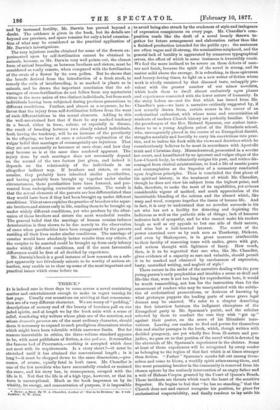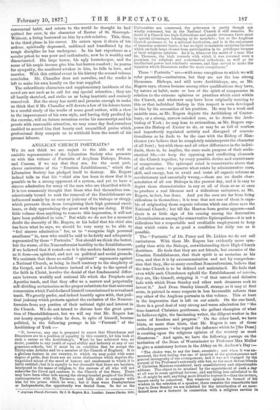THRICE.*
Iv is indeed rare in these days to come across a novel containing matter and entertainment enough to make us regret turning its last page. Usually our sensations on arriving at that consumma- tion are of a very different character. We are weary of "padding," descriptions of scenery and of the beauty of heroines pall on our jaded spirits, and at length we lay the book aside with a sense of relief, wondering why writers whose plots are of the scantiest, and whose dramatis personte are of the most ordinary character, should deem it necessary to expand to such prodigious dimensions stories which might have been tolerable within narrower limits. But for reasons inscrutable to critics, the three-volume standard appears to be, with most publishers of fiction, a sine qua non. It resembles the famous bed of Procrustes,—nothing is accepted which does not meet with its requirements. Is a story short ?—it must be stretched until it has attained the conventional length ; is it long ?—it must be chopped down to the same dimensions,—pro- 'ceases, of course, equally fatal in both cases. Mr. Chandler is mie of the few novelists who have successfully evaded or resisted the snare, and his story has, in consequence, escaped with the life in it. Not that the life is of a high type, however, or that its form is unexceptional. Much as the book impresses us by its vitality, its energy, and concentration of purpose, it is impossible • Thrice GNe,eJ. By W. A. ()handler, Author of "Not to be Broken," ftc. 2 vole Loudon: E. W. Allen.
to avoid being also struck by the crudeness of style and inelegance of expression conspicuous on every page. Mr. Chandler's com- position reads like the draft of a novel loosely thrown to-
gether for, future arrangement and elaboration rather than like a finished production intended for the public eye ; the sentences
are often vague and ill-strung, the nominatives misplaced, and the general lack of lucidity is aggravated by numerous typographical errors, the effect of which in some instances is irresistibly comic.
We feel the more inclined to be severe on these defects of man- ner and finish, because the spirit of the novel is strong, and its matter solid above the average. It is refreshing, in these epicurean and luxury-loving times, to light on a new writer of fiction whose work is wholly untainted by that diseased taste, unhappily pre- valent with the greater number of our minor novelists, which leads them to dwell almost exclusively upon phases and experiences connected with the lower nature of humanity. In the story before us—not the first which has issued from Mr.
Chandler's pen—we have a narrative evidently suggested by, if not actually drawn from, certain scenes in the career of an ecclesiastical enthusiast, with whose name and eccentricities all students of modern Church history are perfectly familiar. Under the pseudonym of the Rev. Richard Sparman, our author intro- duces to us a young Anglican priest of the Ritualistic school, who, uncongenially placed in the centre of an Evangelical district, struggles manfully and fervidly to carry his convictions into prac- tice, and to imbue his flock with the views and doctrines which he conscientiously believes to be most in accordance with Apostolic truth and Christian duty. Misunderstood, prosecuted in a secular law-court, and humilitated by an ignorant and vulgar clique of the Low-Church body, he voluntarily resigns his post, and retires dis- couraged from clerical ministrations, to lead a life of ascetic peace and contemplation as the Superior of a monastery conducted upon Anglican principles. Thus is concluded the first phase of his spiritual history, in the treatment of which Mr. Chandler, though he does not view his subject from the highest point, and fails, therefore, to make the most of its capabilities, yet evinces considerable vigour of method, and much appreciation of the inextricable blending of the solemn and the absurd which, like warp and woof, compose together the tissue of human life. And in fact, it is easy to understand that no novelist succeeds in his art who has not a facility for detecting and depicting the ludicrous as well as the pathetic side of things ; lack of humour indicates lack of sympathy, and he who cannot make his readers laugh as well as cry appeals to but one side of their nature, and wins but a half-hearted interest. The secret of the power exercised over us by such men as Thackeray, Dickens, and even by Shakespeare, is in great measure attributable to their faculty of seasoning tears with smiles, grave with gay, and serious thought with lightness of fancy. How much, then, is it to be regretted that one who, like Mr. Chandler, gives evidence of a capacity so rare and valuable, should permit it to be masked and obscured by carelessness of expression, hasty, unstudied writing, and neglect of style !
There occurs in the midst of the narrative dealing with the poor young parson's early perplexities and troubles a scene so droll and life-like that, were it not too long for reproduction here, it would be worth transcribing, not less for the instruction than for the amusement of readers who may be unacquainted with the subtle- ties of ecclesiastical prosecutions, or desirous of knowing by what grotesque puppets the leading parts of some grave legal dramas may be enacted. We refer to a chapter describing the first interview between the indignant champions of the Evangelical party in Mr. Sparman's parish, and the solicitor selected by them to conduct the case they wish "got up" against their pastor, on the score of his Ritualistic inno- vations. Leaving our readers to find and peruse for themselves this and similar passages in the book, which, though written with decided pungency, are yet wholly free from ill-nature and pre- judice, we pass on to that portion of the novel which is devoted to the chronicle of Mr. Sparman's experiences in the cloister. Some at least of those experiences will be recognised by every reader as belonging to the region of that fact which is at times stranger than fiction. " Father " Sparman's monks fall out among them- selves and come to blows, a worldly spirit arises among them, and the most promising brother in the community is removed from his chosen sphere by the untimely intervention of an angry father and a writ of Habeas Corpus granted by the Court of Queen's Bench. These incidents are thrusts which reach the heart of the sensitive Superior. He begins to feel that "he has no standing," that the Church does not and cannot recognise his position, he pines for ecclesiastical respectabiltity, and finally resolves to lay aside his conventual habit, and return to the world he thought he had quitted for ever, in the character of Rector of St. Sheeroph- Without, a living bestowed on him by a rich relative. This, then, is the third phase in his career. He enters upon it shorn of his ardour, spiritually depressed, saddened and humiliated by the rough discipline he has undergone. In his last experience as a secular priest he was poor and enthusiastic, now he is wealthy and disenchanted. His large house, his ugly housekeeper, and the sense of his ample income give him but barren comfort ; he yearns for sympathy, the manhood awakes in him, he falls in love, and marries. With this critical event in his history the second volume concludes. Mr. Chandler does not moralise, and the reader is left to make his own homily on the text supplied.
The subordinate characters and supplementary incidents of the novel are not such as to call for any special attention ; they are all hastily sketched, and strike us as being inartistic and coarsely conceived. But the story has merit and promise enough to make us think that if Mr. Chandler will devote a few of his leisure hours to a careful study of the works of some good author, with a view to the improvement of his own style, and having duly profited by the exercise, will on future occasions revise his manuscript and his proofs with reasonable attention, we may some day find ourselves enabled to accord him that hearty and unqualified praise which professional duty compels us to withhold from the result of his present labours.



































 Previous page
Previous page